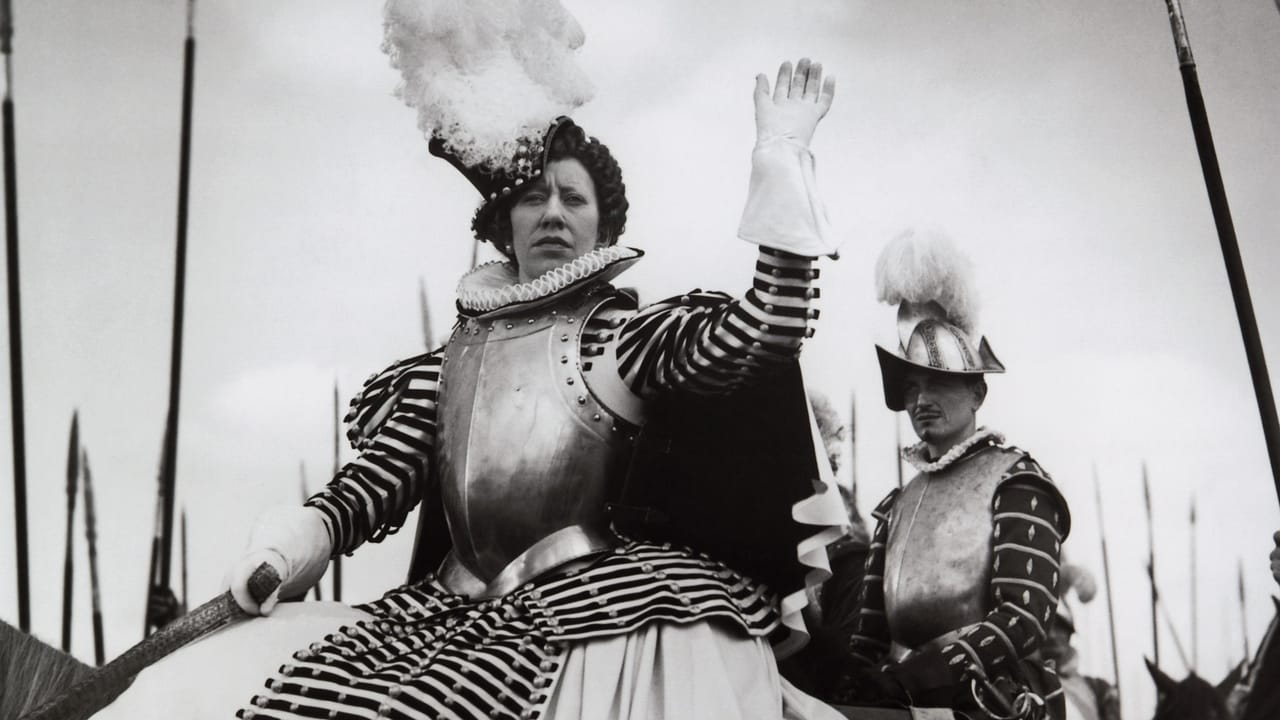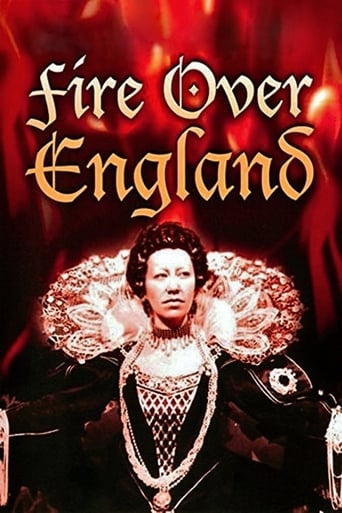

In the opening scene of Fire Over England, we see Scarlett O'Hara picking up her ball gown and trotting down the hall. Her face isn't visible, but Vivien Leigh's run is exactly the same as it was in Gone with the Wind. Her patter of speaking is exactly the same as it was in Gone with the Wind. Her pouty expressions and sass is exactly the same-it's as if someone knew her limited acting capability and decided to write Gone with the Wind for her. She plays a lady in waiting to Queen Elizabeth, and she repeatedly fumbles her duties, including losing the queen's possessions, daydreaming about her boyfriend, and talking back to the queen. Thankfully, Flora Robson-who plays a very believable Queen Elizabeth-slaps her face so the audience doesn't have to.With a very large supporting cast, including Laurence Olivier, Leslie Banks, Raymond Massey, Tamara Desni, Morton Selten, and five minutes each of James Mason and Robert Newton, Fire Over England should have been a successful epic. The costumes are beautiful and Flora is hard, regal, and strong, but somehow the movie falls short. Vivien and Larry play sweethearts, but they have absolutely zero chemistry together; during one of their kisses, it actually looks like she's trying to push him away. Vivien's lack of acting makes you wish she'd been given a smaller part. She wouldn't even be good if she was in a community theater production.My favorite part of the film was the chemistry between Flora and Leslie. There are obvious sparks between them, but since she's the queen and he's her advisor, they don't have the freedom to act like moony-eyed teenagers. Instead, there's an undercurrent of understanding, respect, and attraction lying beneath every line of dialogue. I've seen Leslie Banks in a few Laurence Olivier movies, and every time I see him, I appreciate his performances more and more.
... View MoreI loved this film almost to the end, when unfortunately the propaganda program of the 30s took over and changed the drama into disturbing chauvinism. Well, that was the 30s, and you have to view it in that context, but until you get caught in the hullabaloo of the great armada, it's a perfect film in every way, especially dramatically. The dialogue never loses its pregnancy, all the characters are outstanding, the many plots are interwoven into an expert fabric, and the actors are evidently enjoying their excellence themselves. It's the only film where James Mason and Laurence Olivier act together, they never meet in the film, but Laurence is given the pleasure of standing in for James and does it well - you are actually struck by how like each other they are. Robert Newton is also here in an early part as a Spaniard and for once not overdoing it, while Flora Robson runs the show - there never was a better or more convincing Queen Elizabeth. There is only one shocking scene in the whole film, and that's where Elizabeth unmasks herself. It seems that Flora Robson really has gotten into Elizabeth. Leslie Banks is a very credible Robin Dudley, and Vivien introduces the film as a flippant 18-year old or young lady in waiting, a granddaughter of Burleigh's. Nothing is missing of the glorious era of England's resistance as a small nation against an overwhelming superpower, and everything is fresh and vital, even the Spaniards, and Raymond Massey makes a very brief but entirely realistic portrait of Philip II. This is a film to thoroughly enjoy still today, Laurence Olivier is even better than Errol Flynn, this was his and Vivien's first film together, while the great theme is not the armada but the ideological conflict - the freedom of conscience against the autodafés of Spain, which is well pointed out already in the beginning of the film.
... View MoreI admit I don't know much about the historical aspects of the British, so I defer to others comments about this film. I watched this film more out of curiosity recently when it was on TCM. "Fire Over England" released in 1937, is noteworthy to a true movie fan because of the early pairing of Viven Leigh and Laurence Olivier, who would eventually become Mr. and Mrs. Olivier. They had actually made a few films earlier in England, but they are not well known. In fact, both were not known much in America at all at this point, but of course that would change in two years with Viven Leigh playing Scarlett O'Hara and Laurence Olivier playing Heathcliff. This film is what some call a costume drama, focusing on the 1500's turbulence of England about to go to war with Spain. Flora Robson plays Queen Elizabeth, and she is riveting in the part, and -- in my opinion -- steals every scene she is in. With all due respect to Bette Davis playing the great queen two years later in "The Private Lives of Elizabeth and Essex" Robson's Queen is superior. She carries her not just with the required bitchiness, but with a regal air about her. Davis seemed rather actress and self-conscious in the part. Anyway, this film, while not great, is still worthwhile, although largely forgotten today. It enjoyed something of a revival after Vivien Leigh won the Oscar for "Gone With the Wind," becoming a bona fide star, and Laurence Olivier finally getting the recognition he deserved in "Wuthering Heights."
... View MoreThere is not real film about the events leading to Philip II's great enterprise of 1588, the sailing (and destruction, as it turned out) of the great Spanish Armanda. To understand the story would take too many twists and turns. I recommend Garrett Mattingley's classic account of the Armada from the 1950s for those interested. Philip, tired of the aid that Elizabeth I of England gave to the Dutch and French Protestants, made a plan to transport an army under his nephew, Alexander Farnese, Duke of Palma, from Belgium to England using the Armada. He put the fleet under command of the Spanish nobleman, the Duke of Medina Sidonia. But Medina Sidonia was not a sailor (although a conscientious nobleman and servant of Philip). The Armada would first suffer a raid (by Walter Raleigh and Francis Drake). After it was repaired it did sail, only to find the faster English ships of Drake, Howard, and Frobisher more deadly, and the heavy winds, seas, and storms even deadlier. Many ships were wrecked off Scotland and Ireland. It was one of the worst naval catastrophes of history.However it was also Philip's finest moment. Always a firmly religious man, he did not despair at the disaster to his fleet and plans, but he saw it was God's will. He actually put together Armadas again twice in the 1590s, but neither got as far as the first one did.The complications of the story make it too confusing for anything but a full television seris: Philip was spurred on when Mary, Queen of Scots was executed in 1587 - he had been named her appointed heir to the English throne in her will; the French religious wars were approaching a critical moment, and Mary's uncle (the Duc de Guise) was leader of the Catholic forces at war with King Henri III of France and King Henri of Navarre (the leader of the Huguenots). There have been films dealing with Elizabeth's sea rovers, such as Drake ("Seven Seas To Calais", "The Sea Hawke"), but only this film tries to tackle the actual story of the Armada. As an adventure story it is excellent. As history, not exact but pretty good in parts.First it does touch briefly on Mary's execution, in an early scene where one of Mary's servants tries to assassinate Elizabeth (Flora Robson). It really concentrates on the complex world of Elizabethan spying and the Elizabethan Catholic "underworld". The latter is an unfair description, for the Catholics were being persecuted in England. They had been supporters of Mary, and now that she was killed they gave support (mostly begrudgingly) to Philip. England's master of spies was Sir Francis Walsingham (who does not appear in this film). Instead the espionage against Spain is handled by Robert, Earl of Leicester (Leslie Banks) in the film - but in fact, Leicester died in 1587 in Holland, so he was not around for the Armada.Lawrence Olivier is splendid in this early role as the young agent sent to spy on Philip and his plan (going in place of James Mason, who committed suicide in trying to avoid arrest). Olivier manages to get close to Philip (Raymond Massey) but that is not fully possible. Philip does not even like Englishmen, but he is willing to go along with the Catholics to get rid of Elizabeth and her regime. Philip is not easy to fool, and in a marvelous (almost comic moment) he stops Olivier from disclosing anything by finding that there was one name Olivier does not know that he should.I won't go into the rest of the film's story. Watch it to see how Olivier still manages to escape and save England, and end up with his love (Vivian Leigh). For a 1937 historic film it is quite good, even if it could not tell the completely true story of the invasion of 1588.
... View More